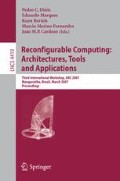Abstract
The alignment of multiple protein (or DNA) sequences is a current problem in Bioinformatics. ClustalW is the most popular heuristic algorithm for multiple sequence alignment. Pairwise alignment has exponential complexity and it is the most time-consuming part of ClustalW. This part of ClustalW was implemented using a reconfigurable logic hardware solution: Hardalign. The system was evaluated using data sets of different dimensionality, and compared with a pure software version running in a embedded processor, as well as running in a desktop computer. Results indicate that such implementation is capable of accelerating significantly part of the algorithm, and this is especially important for processing large protein data sets.
This work was partially supported by the Brazilian National Research Council – CNPq, under research grants no. 305720/2004-0 and 506479/2004-8.
Access this chapter
Tax calculation will be finalised at checkout
Purchases are for personal use only
Preview
Unable to display preview. Download preview PDF.
References
Jacobi, R.P., Ayala-Rincon, M., Carvalho, L.G.A., et al.: Reconfigurable systems for sequence alignment and for general dynamic programming. Genet. Mol. Res. 4, 543–552 (2005)
Kimura, M.: The Neutral Theory of Molecular Evolution. Cambridge University Press, New York (1983)
Lopes, H.S., Moritz, G.L.: A graph-based genetic algorithm for the multiple sequence alignment problem. In: Rutkowski, L., et al. (eds.) ICAISC 2006. LNCS (LNAI), vol. 4029, pp. 420–429. Springer, Heidelberg (2006)
Moritz, G.L., et al.: Implementation of a parallel algorithm for pairwise alignment using reconfigurable computing. In: Proc. IEEE Int. Conf. on Reconfigurable Computing and FPGAs, pp. 99–105. IEEE Computer Society Press, Los Alamitos (2006)
Oliver, T., Schmidt, B., Nathan, D., et al.: Using reconfigurable hardware to accelerate multiple sequence alignment with ClustalW. Bioinformatics 21, 3431–3432 (2005)
Thompson, J.D., Higgins, D.G., et al.: CLUSTALW: improving the sensitivity of progres-sive multiple sequence alignment through sequence weighting, position specific gap penalties and weight matrix choice. Nucleic Acids Res. 22, 4673–4680 (1994)
Author information
Authors and Affiliations
Editor information
Rights and permissions
Copyright information
© 2007 Springer Berlin Heidelberg
About this paper
Cite this paper
Lima, C.R.E., Lopes, H.S., Moroz, M.R., Menezes, R.M. (2007). Multiple Sequence Alignment Using Reconfigurable Computing. In: Diniz, P.C., Marques, E., Bertels, K., Fernandes, M.M., Cardoso, J.M.P. (eds) Reconfigurable Computing: Architectures, Tools and Applications. ARC 2007. Lecture Notes in Computer Science, vol 4419. Springer, Berlin, Heidelberg. https://doi.org/10.1007/978-3-540-71431-6_37
Download citation
DOI: https://doi.org/10.1007/978-3-540-71431-6_37
Publisher Name: Springer, Berlin, Heidelberg
Print ISBN: 978-3-540-71430-9
Online ISBN: 978-3-540-71431-6
eBook Packages: Computer ScienceComputer Science (R0)

